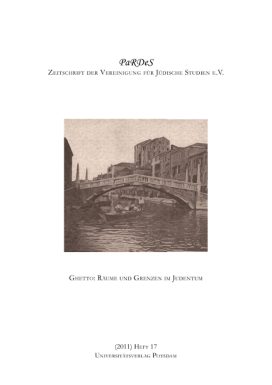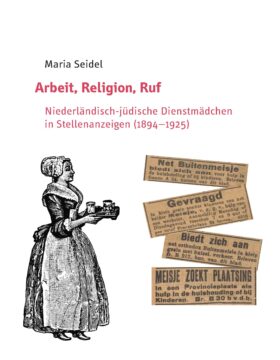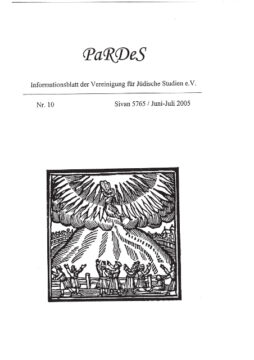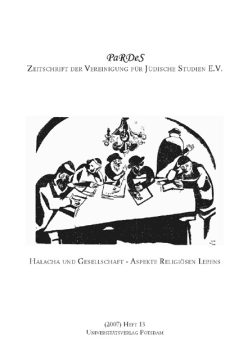Out of the editorial:
Under recourse of two historical forms of ‘ghetto’ – a Jewish quarter in the Early Modern Era and the National Socialist ghetto – the term ‘ghetto’ became stylised as a symbol of yoke and persecution. Through everyday language this established itself as a one sided research perspective, which has the purpose of using the perpetrator-victim-paradigm. Recently people have tried to break this perspective, by analysing the ghetto phenomenon with the use of research categories, for example, ‘living environment’, ‘experience’, ‘construction and area’ as well as ‘ambivalence to the area and border’. The continuing interest in the conceptual reflection of the word ‘ghetto’, including its historical phenomenon together with its reflection in literature and the educational arts, is a strong indication of a change in the viewing habits within this field of research. Following the conducted differentiation, new questions and approaches developed which allowed one to overcome the reduction of this academic field from Jewish history and culture into the category of ‘oppression’ and ‘persecution’. By using this periodical we would like to contribute to this field of expertise. The articles, which are printed here, can be divided into two categories. Firstly there are explicit questions regarding the concept of the ghetto relating to academic historical reflections or new procedures into the research of the historical manifestation of the ghetto. The articles from Kristiane Gerhardt, Svenja Bethke and Hanna Schmidt Holländer as well as Birgitt Wagner belong to this group. In their historiography, or rather methodological orientated discussions, the authors show the normative dimension and the resulting semantic change of the ‘ghetto’ concept together with their consequences in the field of research. In the second category, on the other hand, the phenomenological interested research can be indexed as either historical case studies or observations of literary representations of the topics. The articles from Luca Baraldi, Stratos N. Dordanas and Vaios Kalogrias, Tanja Kinzel, Francisca Solomon and Elvira Grözinger belong to this group.
Rebekka Denz, Grazyna Jurewicz
Rebekka Denz; Grazyna Jurewicz (eds.)
Räume und Grenzen im Judentum
ISBN: 978-3-86956-132-5
318 pages, Paperback
Release year 2011
Series: PaRDeS : Zeitschrift der Vereinigung für Jüdische Studien e.V. , 17
8,00 €
Non-taxable transaction according to § 1 (1) UStG/VAT Act in combination with § 2 (3) UStG/VAT Act a. F. Providing this service, the University of Potsdam does not constitute a Betrieb gewerblicher Art/Commercial Institution according to § 1 (1) No. 6 or § 4 KStG/Corporate Tax Act. If the legal characterization of our business is changed to a commercial institution subsequently, we reserve the right to invoice VAT additionally. zzgl. Versandkosten
Out of the editorial:
Under recourse of two historical forms of ‘ghetto’ – a Jewish quarter in the Early Modern Era and the National Socialist ghetto – the term ‘ghetto’ became stylised as a symbol of yoke and persecution. Through everyday language this established itself as a one sided research perspective, which has the purpose of using the perpetrator-victim-paradigm. Recently people have tried to break this perspective, by analysing the ghetto phenomenon with the use of research categories, for example, ‘living environment’, ‘experience’, ‘construction and area’ as well as ‘ambivalence to the area and border’. The continuing interest in the conceptual reflection of the word ‘ghetto’, including its historical phenomenon together with its reflection in literature and the educational arts, is a strong indication of a change in the viewing habits within this field of research. Following the conducted differentiation, new questions and approaches developed which allowed one to overcome the reduction of this academic field from Jewish history and culture into the category of ‘oppression’ and ‘persecution’. By using this periodical we would like to contribute to this field of expertise. The articles, which are printed here, can be divided into two categories. Firstly there are explicit questions regarding the concept of the ghetto relating to academic historical reflections or new procedures into the research of the historical manifestation of the ghetto. The articles from Kristiane Gerhardt, Svenja Bethke and Hanna Schmidt Holländer as well as Birgitt Wagner belong to this group. In their historiography, or rather methodological orientated discussions, the authors show the normative dimension and the resulting semantic change of the ‘ghetto’ concept together with their consequences in the field of research. In the second category, on the other hand, the phenomenological interested research can be indexed as either historical case studies or observations of literary representations of the topics. The articles from Luca Baraldi, Stratos N. Dordanas and Vaios Kalogrias, Tanja Kinzel, Francisca Solomon and Elvira Grözinger belong to this group.
Recommended Books
-
 2019
2019Zionistische Debatten im Kontext des Ersten Weltkriegs am Beispiel der Herzl-Bund-Blätter 1914–1918
11,50 €Non-taxable transaction according to § 1 (1) UStG/VAT Act in combination with § 2 (3) UStG/VAT Act a. F. Providing this service, the University of Potsdam does not constitute a Betrieb gewerblicher Art/Commercial Institution according to § 1 (1) No. 6 or § 4 KStG/Corporate Tax Act. If the legal characterization of our business is changed to a commercial institution subsequently, we reserve the right to invoice VAT additionally.
zzgl. Versandkosten
Add to cart -
 2021
2021Arbeit, Religion, Ruf
9,00 €Non-taxable transaction according to § 1 (1) UStG/VAT Act in combination with § 2 (3) UStG/VAT Act a. F. Providing this service, the University of Potsdam does not constitute a Betrieb gewerblicher Art/Commercial Institution according to § 1 (1) No. 6 or § 4 KStG/Corporate Tax Act. If the legal characterization of our business is changed to a commercial institution subsequently, we reserve the right to invoice VAT additionally.
zzgl. Versandkosten
Add to cart -
 2005
2005Peter Blastenbrei, Alexander Dubrau, Alfred Einstein, Helga Embacher, Ruvin Ferber, Elvira Grözinger, Karl Erich Grözinger, Tim Hess, Daniel Jütte, Nathanael Riemer, Manfred Voigts
Sivan 5765
2,50 €Non-taxable transaction according to § 1 (1) UStG/VAT Act in combination with § 2 (3) UStG/VAT Act a. F. Providing this service, the University of Potsdam does not constitute a Betrieb gewerblicher Art/Commercial Institution according to § 1 (1) No. 6 or § 4 KStG/Corporate Tax Act. If the legal characterization of our business is changed to a commercial institution subsequently, we reserve the right to invoice VAT additionally.
zzgl. Versandkosten
Add to cart -
 2007
2007Nathanael Riemer, Francesca Albertini, Joel Berger, Rebekka Denz, Alexander Dubrau, Anat Feinberg, Elvira Grözinger, Daniel Jütte, Robert Jütte, Andreas Kennecke, Ulrich Knufinke, Admiel Kosman, Stefan Lang, Israel M. Levinger, Tamara Or, Chayim Schell-Apacik, Manfred Voigts, Wolfgang Wieshaider
Halacha und Gesellschaft
8,00 €Non-taxable transaction according to § 1 (1) UStG/VAT Act in combination with § 2 (3) UStG/VAT Act a. F. Providing this service, the University of Potsdam does not constitute a Betrieb gewerblicher Art/Commercial Institution according to § 1 (1) No. 6 or § 4 KStG/Corporate Tax Act. If the legal characterization of our business is changed to a commercial institution subsequently, we reserve the right to invoice VAT additionally.
zzgl. Versandkosten
Add to cart
Contact
Potsdam University Library
University Press
Am Neuen Palais 10
14476 Potsdam
Germany
verlag@uni-potsdam.de
0331 977-2094
0331 977-2292





